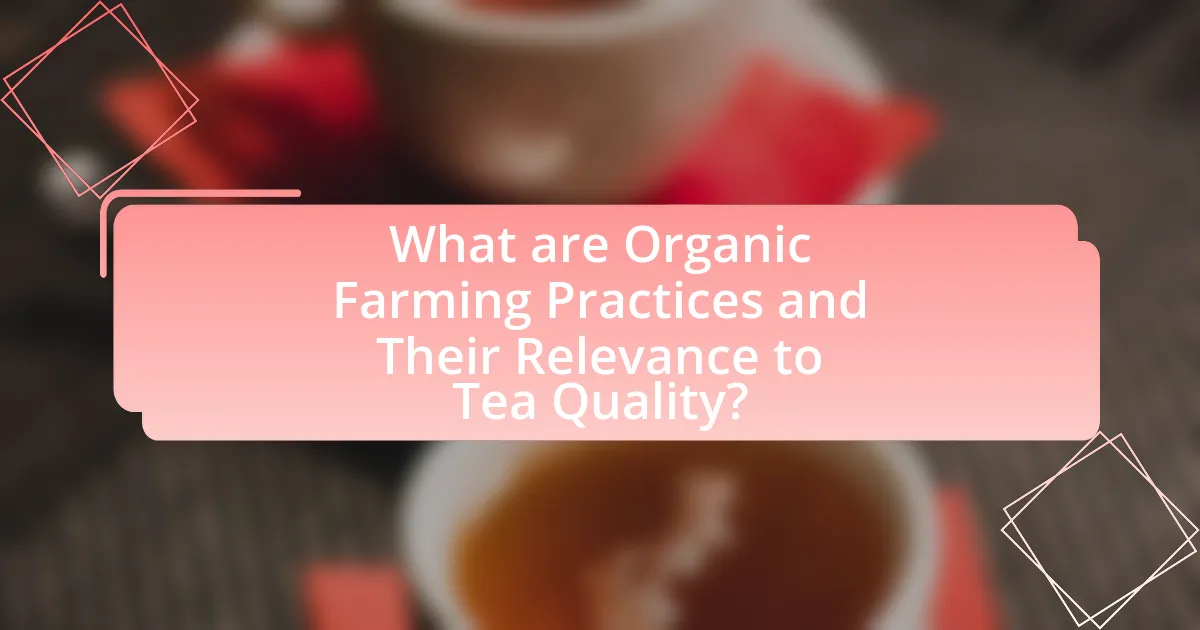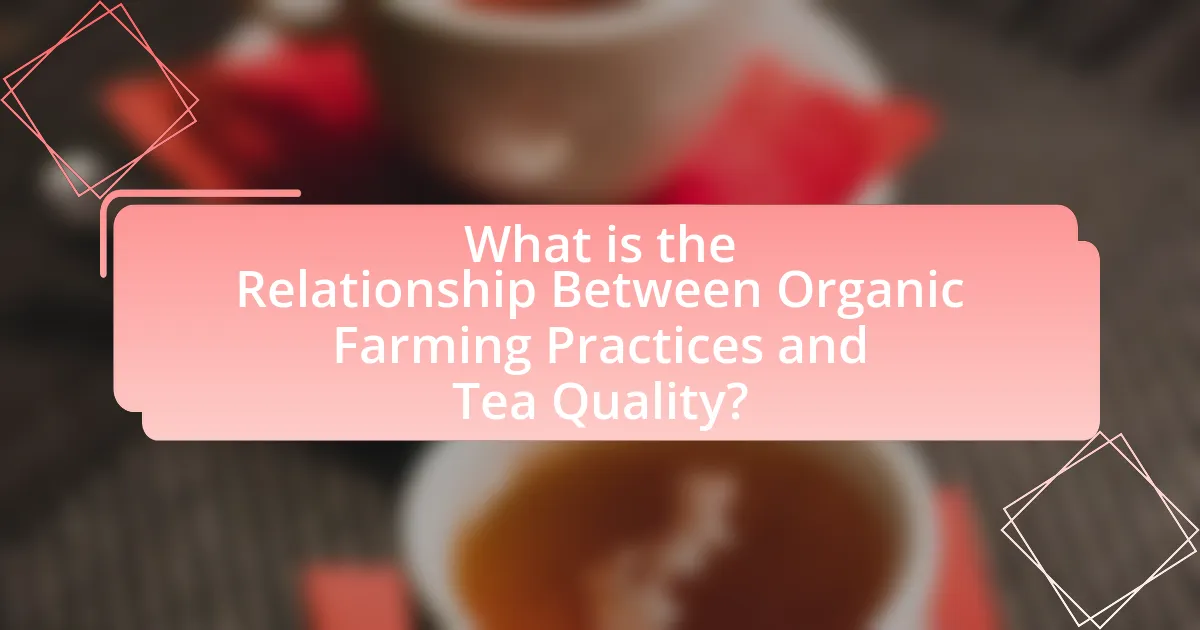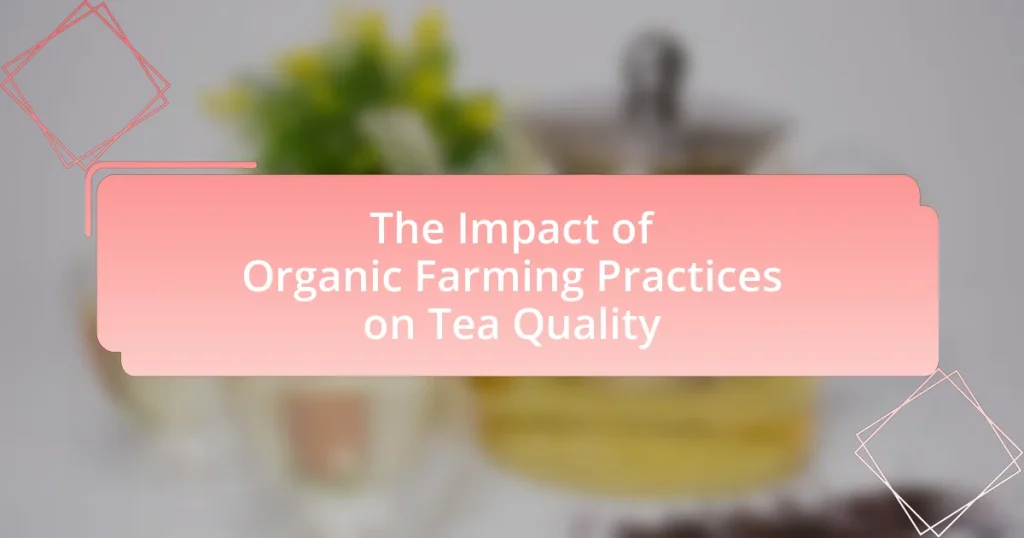The article examines the impact of organic farming practices on tea quality, highlighting the cultivation methods that exclude synthetic fertilizers and pesticides in favor of natural techniques. It details how these practices enhance soil health, promote biodiversity, and lead to higher levels of antioxidants and improved flavor profiles in tea. Key differences between organic and conventional farming methods are discussed, along with specific techniques used in organic tea farming, such as crop rotation and natural pest control. The article also addresses the economic implications of transitioning to organic practices, the challenges faced by organic tea farmers, and the growing consumer demand for organic products, emphasizing the benefits for both producers and consumers.

What are Organic Farming Practices and Their Relevance to Tea Quality?
Organic farming practices involve the cultivation of tea without synthetic fertilizers, pesticides, or genetically modified organisms, focusing instead on natural methods such as composting, crop rotation, and biological pest control. These practices enhance tea quality by promoting healthier soil, which leads to better nutrient uptake by tea plants, resulting in superior flavor profiles and higher antioxidant levels. Research indicates that organic tea can contain up to 30% more antioxidants compared to conventionally grown tea, contributing to its health benefits and overall quality. Additionally, organic farming supports biodiversity and environmental sustainability, which can further enhance the unique characteristics of the tea produced.
How do organic farming practices differ from conventional methods?
Organic farming practices differ from conventional methods primarily in their approach to soil health, pest management, and the use of synthetic inputs. Organic farming emphasizes the use of natural fertilizers, such as compost and manure, to enhance soil fertility, while conventional methods often rely on synthetic fertilizers that can degrade soil health over time. Additionally, organic farming utilizes integrated pest management techniques that focus on biological control and crop rotation, whereas conventional farming frequently employs chemical pesticides that can harm beneficial organisms and lead to pesticide resistance. According to the USDA, organic farming practices can improve biodiversity and soil structure, which are critical for sustainable agriculture and can positively impact the quality of tea produced.
What specific techniques are used in organic tea farming?
Organic tea farming employs specific techniques such as crop rotation, composting, and the use of natural pest control methods. Crop rotation helps maintain soil fertility and reduce pest buildup, while composting enriches the soil with organic matter, enhancing nutrient availability for tea plants. Natural pest control methods, including the introduction of beneficial insects and the use of organic pesticides, minimize chemical residues and promote biodiversity. These techniques collectively contribute to improved soil health and tea quality, as evidenced by studies showing that organic practices can lead to higher antioxidant levels in tea leaves compared to conventionally grown tea.
How do these techniques impact soil health and biodiversity?
Organic farming techniques enhance soil health and biodiversity by promoting nutrient-rich soil and fostering diverse ecosystems. Practices such as crop rotation, cover cropping, and reduced chemical inputs improve soil structure and fertility, leading to increased microbial activity and organic matter content. Research indicates that organic farming can increase soil organic carbon levels by 30% compared to conventional methods, which supports a wider range of soil organisms. Additionally, organic practices encourage the presence of beneficial insects and pollinators, contributing to greater biodiversity. Studies show that organic farms typically host 30% more species of plants and animals than conventional farms, highlighting the positive impact on ecological diversity.
Why is tea quality important in the context of organic farming?
Tea quality is crucial in organic farming because it directly influences consumer perception and market value. High-quality tea produced through organic methods often commands higher prices and attracts health-conscious consumers who prefer products free from synthetic pesticides and fertilizers. Research indicates that organic farming practices can enhance the flavor profile and antioxidant content of tea, making it more appealing to buyers. For instance, a study published in the Journal of Agricultural and Food Chemistry found that organic teas had higher levels of polyphenols, which are linked to health benefits. Thus, maintaining high tea quality is essential for the economic viability of organic tea producers and the overall success of organic farming initiatives.
What factors contribute to the quality of tea?
The quality of tea is influenced by several key factors, including the variety of the tea plant, the growing conditions, and the processing methods. The tea plant variety determines the flavor profile and aroma, with specific cultivars like Camellia sinensis producing distinct characteristics. Growing conditions, such as soil quality, altitude, and climate, significantly affect the chemical composition of the leaves, impacting taste and health benefits. Processing methods, including plucking, withering, oxidation, and drying, are crucial in developing the final flavor and aroma of the tea. Research indicates that organic farming practices can enhance these factors by promoting healthier soil and biodiversity, leading to higher quality tea.
How does consumer perception influence the demand for organic tea?
Consumer perception significantly influences the demand for organic tea by shaping preferences and purchasing behaviors. Positive perceptions regarding health benefits, environmental sustainability, and ethical sourcing lead consumers to favor organic tea over conventional options. For instance, a study published in the Journal of Consumer Research found that consumers are willing to pay a premium for organic products due to perceived health advantages and a belief in better quality. This perception drives higher demand, as consumers increasingly associate organic tea with superior taste and safety, further reinforcing their purchasing decisions.

What is the Relationship Between Organic Farming Practices and Tea Quality?
Organic farming practices significantly enhance tea quality by promoting healthier soil and reducing chemical residues. Studies indicate that organic tea often exhibits higher levels of antioxidants and better flavor profiles compared to conventionally grown tea. For instance, research published in the Journal of Agricultural and Food Chemistry found that organic tea had up to 30% higher polyphenol content, which is crucial for flavor and health benefits. Additionally, organic farming methods improve biodiversity and soil health, leading to more robust tea plants that produce superior leaves.
How do organic practices affect the chemical composition of tea?
Organic practices significantly influence the chemical composition of tea by enhancing the levels of beneficial compounds such as polyphenols, flavonoids, and amino acids. Research indicates that organic tea tends to have higher concentrations of these compounds compared to conventionally grown tea, primarily due to the absence of synthetic fertilizers and pesticides, which can alter plant metabolism. A study published in the Journal of Agricultural and Food Chemistry found that organic tea leaves exhibited a 20-30% increase in total polyphenol content, which is linked to improved antioxidant properties. Additionally, organic farming promotes soil health and biodiversity, further contributing to the enhanced chemical profile of the tea.
What role do organic fertilizers play in enhancing tea flavor?
Organic fertilizers significantly enhance tea flavor by improving soil health and nutrient availability. The application of organic fertilizers, such as compost and manure, enriches the soil with essential nutrients like nitrogen, phosphorus, and potassium, which are crucial for the growth of tea plants. This nutrient-rich environment promotes the synthesis of flavor compounds, such as amino acids and polyphenols, which directly contribute to the taste and aroma of tea. Research indicates that tea produced with organic fertilizers often exhibits higher levels of these flavor compounds compared to those grown with synthetic fertilizers, leading to a more complex and desirable flavor profile.
How does pest management in organic farming influence tea quality?
Pest management in organic farming significantly influences tea quality by promoting healthier plants and enhancing flavor profiles. Effective pest control methods, such as the use of natural predators and organic pesticides, reduce pest damage, which can lead to higher yields and better-quality leaves. Research indicates that organic tea, which employs these pest management strategies, often exhibits superior taste and aroma compared to conventionally grown tea, as evidenced by studies showing that organic practices can enhance the concentration of beneficial compounds like polyphenols and flavonoids. These compounds are crucial for the tea’s flavor and health benefits, thereby directly linking pest management in organic farming to improved tea quality.
What are the sensory attributes of tea produced through organic farming?
Tea produced through organic farming typically exhibits enhanced sensory attributes, including a more vibrant aroma, richer flavor, and smoother mouthfeel. These qualities arise from the absence of synthetic fertilizers and pesticides, which allows the tea plants to develop their natural characteristics more fully. Research indicates that organic tea often has higher concentrations of beneficial compounds, such as polyphenols and amino acids, contributing to its complex taste profile. For instance, a study published in the Journal of Agricultural and Food Chemistry found that organic tea samples had significantly higher levels of catechins, which are known for their positive impact on flavor and health benefits.
How do aroma and taste differ in organic versus non-organic tea?
Organic tea typically exhibits a more complex aroma and taste compared to non-organic tea. This difference arises from the absence of synthetic pesticides and fertilizers in organic farming, which allows for a more diverse ecosystem and healthier soil. Research indicates that organic tea often contains higher levels of beneficial compounds, such as polyphenols and flavonoids, which contribute to its richer flavor profile and aromatic qualities. A study published in the Journal of Agricultural and Food Chemistry found that organic teas had significantly higher antioxidant activity, enhancing both aroma and taste.
What is the impact of organic farming on tea color and appearance?
Organic farming positively impacts tea color and appearance by enhancing the vibrancy and clarity of the leaves. This is primarily due to the absence of synthetic fertilizers and pesticides, which can alter the natural pigmentation of tea plants. Research indicates that organic tea often exhibits a richer green hue and a more appealing overall appearance compared to conventionally grown tea. A study published in the Journal of Agricultural and Food Chemistry found that organic tea leaves contain higher levels of chlorophyll and polyphenols, contributing to their superior color and visual quality.

What Challenges and Opportunities Exist in Organic Tea Farming?
Organic tea farming faces several challenges and opportunities. Key challenges include pest management, which can be more difficult without synthetic pesticides, and the need for certification, which can be costly and time-consuming. Additionally, organic tea farmers often deal with lower yields compared to conventional farming due to the absence of chemical fertilizers. However, opportunities in organic tea farming are significant; the demand for organic products is rising, with the global organic tea market projected to grow at a CAGR of 5.5% from 2021 to 2028. Furthermore, organic farming practices can enhance soil health and biodiversity, leading to improved tea quality and potentially higher market prices.
What are the common challenges faced by organic tea farmers?
Organic tea farmers commonly face challenges such as pest management, soil fertility, and market access. Pest management is particularly difficult because organic methods often rely on natural predators and organic pesticides, which may not be as effective as synthetic alternatives. Soil fertility can be a challenge due to the absence of chemical fertilizers, requiring farmers to implement crop rotation and composting, which can be labor-intensive and time-consuming. Additionally, market access poses a significant hurdle, as organic tea often requires certification, which can be costly and complex, limiting the ability of farmers to reach broader markets. These challenges are supported by research indicating that organic farming practices can lead to lower yields and higher production costs compared to conventional methods, impacting the overall viability of organic tea farming.
How do market access and certification affect organic tea production?
Market access and certification significantly influence organic tea production by determining the ability of producers to sell their products and ensuring compliance with organic standards. Certification provides credibility and access to premium markets, as consumers increasingly prefer certified organic products. For instance, the global organic tea market was valued at approximately $1.5 billion in 2020, with a projected growth rate of 10% annually, driven by consumer demand for certified organic options. Furthermore, certification processes often require adherence to specific agricultural practices, which can enhance the quality of tea by promoting sustainable farming methods. Thus, effective market access and robust certification systems are crucial for the success and quality of organic tea production.
What are the economic implications of transitioning to organic practices?
Transitioning to organic practices can lead to increased production costs but may also result in higher market prices and improved profitability over time. Organic farming often requires more labor and investment in organic inputs, which can elevate initial costs. However, studies indicate that organic products typically command premium prices; for instance, organic tea can sell for 20-50% more than conventional tea, enhancing revenue potential. Additionally, organic practices can improve soil health and biodiversity, leading to long-term sustainability and reduced dependency on chemical inputs, which can lower costs in the long run. Research from the Rodale Institute shows that organic farming can yield comparable or even higher profits than conventional methods when considering market premiums and reduced input costs.
What opportunities can arise from adopting organic farming practices in tea production?
Adopting organic farming practices in tea production can lead to increased market demand and premium pricing for organic tea products. This is supported by the growing consumer preference for organic products, which has resulted in a significant rise in the organic tea market, projected to reach USD 2.5 billion by 2025, according to a report by Grand View Research. Additionally, organic farming enhances soil health and biodiversity, which can improve tea quality and yield over time, further contributing to economic benefits for producers.
How can organic tea farming contribute to sustainability and environmental health?
Organic tea farming contributes to sustainability and environmental health by promoting biodiversity, reducing chemical inputs, and enhancing soil health. By avoiding synthetic pesticides and fertilizers, organic tea farming protects local ecosystems and encourages the presence of beneficial insects and microorganisms. Research indicates that organic farming practices can increase soil organic matter by 20-30%, which improves soil structure and fertility, leading to healthier tea plants. Additionally, organic tea farms often implement crop rotation and intercropping, which further supports biodiversity and reduces the risk of pest outbreaks. These practices collectively contribute to a more sustainable agricultural system that prioritizes environmental health.
What are the potential benefits for farmers and consumers in the organic tea market?
Farmers and consumers in the organic tea market benefit from improved health outcomes and economic advantages. For farmers, organic practices lead to higher prices for their products, as organic tea often commands a premium in the market, resulting in increased income. Additionally, organic farming enhances soil health and biodiversity, which can lead to more sustainable farming practices over time. For consumers, organic tea is associated with lower pesticide residues and higher antioxidant levels, contributing to better health benefits. Research indicates that organic tea contains significantly higher levels of polyphenols, which are beneficial for health, compared to conventionally grown tea. This combination of economic and health benefits underscores the advantages of participating in the organic tea market for both farmers and consumers.
What Best Practices Should Be Followed for Enhancing Tea Quality through Organic Farming?
To enhance tea quality through organic farming, best practices include implementing crop rotation, using organic fertilizers, and maintaining soil health. Crop rotation prevents soil depletion and pest buildup, which can negatively affect tea quality. Organic fertilizers, such as compost and green manure, enrich the soil with essential nutrients, promoting healthier tea plants. Additionally, maintaining soil health through practices like mulching and cover cropping improves water retention and microbial activity, which are crucial for high-quality tea production. Research indicates that organic farming can lead to superior tea quality, as evidenced by studies showing that organic teas often have higher antioxidant levels compared to conventionally grown teas.


